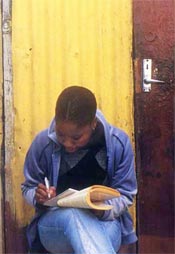| |
 |
 |
|
 |
 |
|
 |
 |
|
 |
| EFA Global Monitoring Report |
 |
 Books 2 of 14
Books 2 of 14

 |
| The Leap to Equality - Gender and Education for All |
| |
 The EFA Global Monitoring Report is produced by an independent, international team based at UNESCO in Paris (France), with the UNESCO Institute for Statistics (UIS) in Montreal. The Report Team is headed by Professor Christopher Colclough, an eminent British education and development expert. It is funded jointly by UNESCO and multilateral and bilateral agencies, and benefits from the expertise of an international Editorial Board, chaired by Dr Anil Bordia, head of the Foundation for Education and Development (India). The EFA Global Monitoring Report is produced by an independent, international team based at UNESCO in Paris (France), with the UNESCO Institute for Statistics (UIS) in Montreal. The Report Team is headed by Professor Christopher Colclough, an eminent British education and development expert. It is funded jointly by UNESCO and multilateral and bilateral agencies, and benefits from the expertise of an international Editorial Board, chaired by Dr Anil Bordia, head of the Foundation for Education and Development (India).
During bi-annual meetings, the Board discusses the scope and contents of the Report underway and provides advice on its future development.
The Report is developed over a 12 to 18-month period. It draws on scholarship and expertise from governments, NGOs, bilateral and multilateral agencies, UNESCO institutes and research institutions. It is submitted to the Director-General of UNESCO on an annual basis and considered by the High-Level Group on Education for All , comprising 24 members, including government ministers, representatives of donor organizations, UN agencies and non-governmental organizations. Its role, as stated in the Dakar Framework for Action (paragraph 19), is to sustain and accelerate the political momentum created at the World Education Forum and serve as a lever for resource mobilization.
Origins
The Global Monitoring Report stems from the Dakar Framework for Action , adopted by the World Education Forum held in Dakar (Senegal) in 2000. At this Forum, 164 governments agreed on six goals (link) which were considered to be essential, attainable and affordable given strong international commitment and resolve. The Dakar goals specify that by 2015 all children of primary school age would participate in free schooling of acceptable quality, gender disparities would be eliminated, levels of adult illiteracy halved, early childhood care and education enhanced, learning opportunities for youth and adults greatly expanded, and all aspects of education quality improved.
In Article Eight of the Dakar Framework, governments, organizations and agencies represented at the World Education Forum pledged to “systematically monitor progress towards EFA goals and strategies at the national, regional and international levels”.
In the same year, the Millenium Development Goals were agreed, two of which universal primary education (UPE) an the elimination of gender disparities in primary and secondary education were defined as critical to the elimination of extreme poverty.
The EFA movement
The Education for All movement can be traced back to the World Conference on Education for All , held in Jomtien, Thailand in 1990. The Conference was convened by UNESCO, UNICEF, UNDP and the World Bank in response to widespread concern over a “lost decade” in education during which significant advances were eroded in many countries. The Conference, attended by delegates from 155 governments, intergovernmental organisations and NGOs, agreed on an “expanded vision” of learning for all children, youth and adults. This vision focuses on universalizing access and promoting equity; better learning; broadening the means and scope of basic education; enhancing the environment for learning and strengthening partnerships.
The World Declaration on Education for All adopted in Jomtien affirms that “Every person - child, youth and adult - shall be able to benefit from educational opportunities designed to meet their basic learning needs.” Participants pledged to provide primary education for all children and to massively reduce adult illiteracy by the end of the decade.
As a prelude to the ten-year review at the World Education Forum in Dakar, 180 countries took part in the EFA 2000 Assessment, a detailed analysis of the state of basic education around the world. Each country assessed its own progress toward the goals of Jomtien and then reported its findings at regional meetings in late 1999 and 2000. The Assessment can be consulted along with fourteen thematic studies on educational issues of global concern. |
|
 |
 |
 Email this page Email this page  Printable version Printable version
|
 |
|
|


